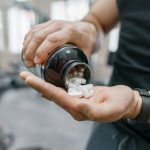Preparing for a fitness competition is an arduous yet rewarding journey. It requires a blend of mental fortitude, rigorous training, and precise nutrition. Whether you are a novice or a seasoned competitor, the path to showcasing your best physique on stage involves meticulous planning and unwavering commitment. This article aims to provide a comprehensive guide on how to successfully prepare for a fitness competition, covering everything from workout routines to diet plans and mental preparation.
Understanding the Commitment
Entering a fitness competition isn't just about wanting a trophy; it’s about transforming your body and mind. Competitors often start their journey months in advance, dedicating countless hours to gym workouts, meal prepping, and learning about their bodies’ responses to different stimuli. This process demands discipline, resilience, and a positive mindset. When you decide to compete, you are committing to a lifestyle change that goes beyond the competition day.
Designing an Effective Training Plan
A well-structured training plan is the cornerstone of any successful fitness competition preparation. Training should be divided into phases, each focusing on different aspects of muscle development and fat loss.
Initial Phase: Building a Strong Foundation
The initial phase, often spanning the first few weeks, focuses on building muscle mass and strength. This period includes heavy compound lifts such as squats, deadlifts, and bench presses. These exercises recruit multiple muscle groups, promoting overall growth.
A typical workout split might look like this:
- Day 1: Legs and Calves
- Day 2: Back and Biceps
- Day 3: Rest or Light Cardio
- Day 4: Chest and Triceps
- Day 5: Shoulders and Abs
- Day 6: Full Body or Active Recovery
- Day 7: Rest
Incorporate progressive overload in your training regimen to consistently challenge your muscles. This could mean gradually increasing the weight, volume, or intensity of your workouts.
Intermediate Phase: Refining and Shaping
Once a solid foundation is built, the intermediate phase involves refining the muscle definition and symmetry. This period is crucial for identifying and addressing any physique imbalances. Higher repetition ranges with moderate weights become more prominent. Including isolation exercises such as bicep curls, tricep pushdowns, and leg extensions will help in sculpting the muscles.
Cardio is also introduced to promote fat loss while retaining muscle mass. High-Intensity Interval Training (HIIT) is particularly effective during this phase. An example of a HIIT session might involve 30 seconds of all-out sprinting followed by 30 seconds of walking, repeated for 20-30 minutes.
Final Phase: Fine-tuning
The final phase, typically the last few weeks before the competition, focuses on fine-tuning the physique. Here, the training volume may reduce slightly to prevent overtraining and injuries. The goal is to maintain muscle mass while meticulously stripping away any remaining body fat.
During this period, it is essential to pay close attention to posing practice. Good posing can significantly enhance the appearance of your physique on stage. Spend time each day practicing poses that highlight your strengths and mask any weaknesses.
The Role of Nutrition
Training alone isn't enough to prepare for a fitness competition; nutrition plays a pivotal role. The right diet can enhance muscle growth, promote fat loss, and ensure overall well-being.
Macronutrient Breakdown
Understanding the macronutrient breakdown of your diet is crucial. Competitors typically cycle through different phases of diet—bulking, cutting, and maintenance.
- Protein: Essential for muscle repair and growth. Aim for high-quality sources such as chicken breast, lean beef, and fish. Protein powders can be used to supplement your intake.
- Carbohydrates: Provide the energy required for intense workouts. Opt for complex carbs like brown rice, sweet potatoes, and oatmeal.
- Fats: Necessary for hormone production and overall health. Include healthy fats such as avocados, nuts, and olive oil.
During the initial phase, your diet might be higher in carbohydrates to fuel muscle growth. As you transition to the cutting phase, carbohydrate intake is gradually reduced to promote fat loss.
Water Intake and Hydration
Proper hydration is vital throughout your preparation. Water supports all bodily functions, aids in digestion, and can improve performance. Aim for at least 3-4 liters of water per day. In the final week before the competition, water intake strategies may vary. Some competitors reduce water intake on the last day to achieve a sharper appearance.
Sample Meal Plan
Here is a sample meal plan for a competitor weighing around 200 pounds and carrying between 10% and 12% body fat:
- Meal 1: Whey/casein protein powder mix (2 scoops), oatmeal (3.1 oz uncooked)
- Meal 2: Chicken breast (7.1 oz cooked), brown rice (6.7 oz cooked)
- Meal 3: Tilapia (8.3 oz cooked), large mixed salad with olive oil (1 tbsp)
- Meal 4: Whey protein powder (2 scoops), white potato (10 oz cooked)
- Meal 5: Top-round steak (7.1 oz cooked), sweet potato (5.5 oz cooked)
- Meal 6: Casein protein powder (2 scoops)
As Muscle & Fitness suggests, adjusting the quantities and macronutrient split based on individual responses and progress is key.
Mental Preparation
The mental aspect of competition preparation is often overlooked but is just as important as physical readiness. Competitors face numerous challenges, including social sacrifices, dietary restrictions, and constant self-assessment.
Setting Clear Goals
Setting clear, realistic goals helps maintain motivation. Break down your ultimate goal of competing into smaller, manageable milestones. Celebrate these small victories as they will keep you motivated throughout the journey.
Visualization Techniques
Visualization can be a powerful tool. Spend a few minutes each day visualizing yourself performing on stage, going through your poses, and hearing your name being called as a winner. This mental rehearsal can boost confidence and reduce anxiety.
Managing Stress
Effective stress management techniques such as mindfulness, meditation, or yoga can be beneficial. These practices can help maintain a positive mindset, which is essential for sticking to the rigorous training and diet plans.
Support System
Having a strong support system of family, friends, and fellow competitors can make a significant difference. Surround yourself with people who understand your goals and are willing to support you through the ups and downs of competition prep.
Supplementation
While whole foods should account for the majority of your nutrition, supplements can fill in the gaps and enhance performance.
Essential Supplements
- Protein Powder: Convenient and effective for meeting daily protein requirements. Whey and casein are popular choices.
- BCAAs (Branched-Chain Amino Acids): Can help in muscle recovery and reducing muscle soreness.
- Creatine: Enhances strength and power, allowing for more intense workouts.
- Multivitamins: Ensure you are meeting all your micronutrient needs, especially when on a calorie-restricted diet.
- Fish Oil: Provides essential fatty acids that support heart health and reduce inflammation.
Timing and Dosage
The timing and dosage of supplements can impact their effectiveness. For example, consuming protein powder post-workout can aid in muscle recovery, while taking BCAAs during workouts can prevent muscle breakdown. It is essential to follow recommended dosages and consult with a healthcare professional if unsure.
Final Week: Peak Week
The final week, also known as peak week, is where all the hard work comes together. This week involves specific strategies to enhance your physique's appearance on stage.
Carb Loading and Depletion
Carb loading involves manipulating carbohydrate intake to fill out muscle glycogen stores, making muscles appear fuller. This process typically starts with a depletion phase, where carbs are minimized for a few days, followed by a loading phase where carb intake is increased.
Water Manipulation
As mentioned earlier, water manipulation strategies involve adjusting water intake to achieve a leaner, more defined look. This often includes drinking large amounts of water early in the week, followed by reducing intake closer to the competition day.
Sodium Intake
Sodium intake can also be manipulated to reduce water retention and enhance muscle definition. This typically involves consuming normal sodium levels early in the week and then reducing them in the final days.
Rest and Recovery
Ensure you get enough rest and recovery in the final week. Reduce training volume and intensity to avoid fatigue and injuries. Focus on relaxation and mental preparation.
Competition Day
On competition day, all your hard work will be showcased. Here are some tips to make the most out of your big day:
Arrive Early
Arrive early at the venue to familiarize yourself with the environment. This can help reduce anxiety and give you time to prepare mentally and physically.
Stay Hydrated
Stay hydrated but avoid over-drinking. Sip water as needed to prevent dehydration.
Posing and Presentation
Posing is critical, as it displays your physique to its best advantage. Practice your poses and transitions until they become second nature. Presentation includes everything from your tan to your stage attire. A good stage tan can enhance muscle definition and symmetry.
Enjoy the Experience
Despite the intense preparation, remember to enjoy the experience. Competing is a celebration of your hard work and dedication. Embrace the moment and have fun.
Post-Competition: Recovery and Reflection
The period after the competition is crucial for recovery and reflection. It’s essential to transition back to a balanced lifestyle while reflecting on your performance.
Reverse Dieting
Reverse dieting involves gradually increasing your calorie intake to avoid sudden weight gain and metabolic issues. Slowly reintroduce carbohydrates and fats to your diet while monitoring your body’s response.
Rest and Recovery
Take a break from intense training to allow your body to recover. Engage in light activities such as walking or yoga.
Reflect and Plan
Reflect on your competition experience. Identify areas for improvement and set new goals. Whether you plan to compete again or focus on other fitness goals, this reflection will help you grow and progress.
Conclusion
Preparing for a fitness competition is a multifaceted journey that tests physical limits and mental resilience. From meticulous training and precise nutrition to mental preparation and strategic planning, every aspect plays a role in achieving success on stage. By following the guidelines outlined in this article and leveraging resources like the Bodybuilding.com and Muscle & Fitness, you can optimize your preparation and step on stage with confidence and pride. Embrace the journey, stay dedicated, and enjoy the transformation.









